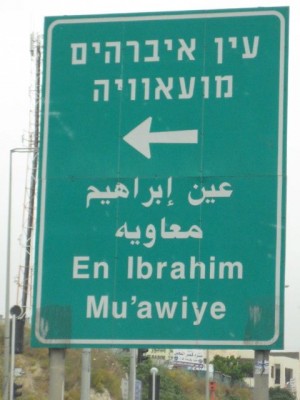Our Heritage is Multicultural
Israeli Prime Minister Benjamin Netanyahu really knows how to irritate the Palestinians. His announcement this week of a list of “National Heritage Sites” which included two very important ones in Hebron and near Bethlehem, sparked days of rioting and drew the rebuke of the entire world, including the United States.
What, Bibi pleaded, is the fuss all about? “There has been a misunderstanding. We do not intend to alter the status quo,” he said.
Well, yes, that’s precisely the problem. The sites in question – the Tomb of the Patriarchs in Hebron and Rachel’s Tomb – are sites of very great historical and religious importance to Jews, and the former also holds great significance to Muslims. But their importance to Judaism combines with this new designation to imply to Palestinians that Israel will endeavor to maintain control over them. In other words, it has no intention of ending the Occupation at all.
The designation doesn’t actually change anything about Israeli control or intentions, and it doesn’t immediately put any more steam behind any Israeli claim to the West Bank. Netanyahu is right about that. But it does raise important questions, perhaps more of them than Bibi intended.
The flip side of the National Heritage list has gotten far less attention; that is that the National Heritage list includes only Jewish sites. Sites which have significance to other faiths as well as Judaism are treated only in terms of their Jewish importance and.
So, what nation is it whose heritage is being claimed here? Obviously, the Jewish nation. That seems natural for the Jewish state, of course.
The problem is that while Israel may be the Jewish state, it is not only Jewish. One-fifth of its population is not Jewish, and they are a part of the state. This is not a small problem. As geographer Oren Yiftachel said, the exclusive nature of this Heritage Plan is “a small but very symbolic step to the effect that the dominant group is not capable of maturely including the other groups that live here… If the dominant group were surer of itself, then what would it care if they preserved the mosque in Be’er Sheva?”
This has been a vexing, philosophical problem in Zionist thinking from the very beginning. The simple historical fact is that the Land of Israel may be Zion for the Jews, but it has a history that is far from exclusively Jewish. Even the Jewish aspects are related to, and in many cases, revered by Christianity and Islam; and some very important religious and historical sites in Israel and the West Bank are not related to Judaism at all. Yet they all come together to form the rich tapestry of the land’s history—and its present.
Israel had made progress in integrating the Arab minority over its first five decades, but that progress has stalled and perhaps even regressed in the 21st century. It is also reflected in Israel’s inability to see that its military superiority has changed the landscape in which it lives and that, while it certainly still faces very real threats, it is not in the kind of position it was in in 1967, much less 1948.
In those days, before the pivotal events of the Six Day War, Israel really had to fear annihilation by its neighbors. In 1948, the military victory of the Yishuv over the surrounding Arab states was no sure thing, even given the new facts revealed about that war that show that the actual military capabilities of each sides were much more evenly matched than was previously believed.
In 1967, few Israelis could have imagined the astounding victory that their country would bring home in June. Israel’s previous military ventures, in 1948 and 1956, had not shown that Israel by itself was capable of anything like that.
But in the intervening years, the balance of power changed. There is no longer any real possibility of an Arab threat to Israel’s existence. The Iranian threat is real, but is of a different nature than the Arab one of old. Yet that insecurity remains.
Why? The reason is strangely circular. The insecurity itself breeds actions that further polarize Jews from non-Jewish Arabs, which increases the insecurity.
The Jewish connection and Zionist claim to the “Land of Israel” or to the territory that was once known as “Palestine” is undeniably real. Yet no matter what historical period you look at, this was never an exclusively Jewish (or, in ancient days, Hebrew) land. What validated the Zionist claim was not that this land was exclusively “Jewish,” but that there was no other land that could credibly be connected to the Jews as a homeland. The notion of redeeming the land, bringing it back to the Jews, undoubtedly a key part of Zionist ethos, is now undermining the Zionist dream of a Jewish democracy (which is not, as some contend, necessarily a contradiction in terms, though it is a difficult and delicate balancing act).
The issue at hand is very much the character of the Israeli state. Yiftachel’s point is crucial in its implications: Israel need not sacrifice its Jewish character nor its place as the worldwide center of Jewish self-determination and expression in order to embrace the other cultures that make up the fabric of the country. It can be both Jewish and multicultural.
Nor, for that matter, does Israel need to own all that is Jewish in the area to sustain itself. Without a doubt, any future that holds a workable permanent status agreement with the Palestinians cannot exclude Israeli-Jewish access to the Tomb of the Patriarchs. One of the most difficult memories to overcome in the Israeli mind is the period from 1948-1967 when Jews could not get to the holiest and most meaningful places in Jerusalem under Jordanian rule.
If Israel needs international guarantees backed by the United States to ensure that access, then it should have them. Just as Israel is responsible to ensure that Christians can get to Nazareth or Tiberias (or, at this time, to the Via Dolorosa), the Palestinians must be responsible for Jewish access to the Tomb of the Patriarchs.
Yiftachel’s point is that Israel is now a strong and established country and society. It must overcome its own insecurities and accept that the state is multicultural, with a Jewish majority that sets a tone for the country. This kind of security – the psychological security that Israel is now strong enough to attain yet has not come close to – is what will allow Israel and world Jewry to confront the radicals within our midst who are mooting a two-state solution. It is what will allow Israel to revive its internal civil rights movement that was gaining some steam at the end of the 20th century before the collapse of the Oslo Process and the second Intifada derailed it.
This isn’t an easy process, and cannot succeed if it happens only in Israel. This is precisely where Israeli and Diaspora Jews must come together and consider who we will be in the 21st century and beyond. It will take time, but this incident demonstrates that the time to start is now.
Netanyahu knew that by taking this step he was stirring up the Palestinian powder keg just as George Mitchell was making progress in restarting talks. He knew as well that the United States would say something about it, but not object too strenuously. And Bibi surely knew that it was also coming at a time when the frustration of Mahmoud Abbas and the rest of the PA was starting to lean them to more radical steps because of the dead end they seem to have run into.
But he also opened an important can of worms for Jews everywhere, and it’s high time we stopped putting off the inevitable and dealt with it. The Land of Israel may be the Zion of prophecy, but the state of Israel is a political reality and a piece of real estate that, whatever the future holds, Jews will be sharing with others. It’s time Israel and Diaspora Jews figured out how to come to grips with that reality.
![[the current issue of ZEEK]](../../image/2/100/0/5/uploads/leftistethicistgraphic-52842c6a.png)
- 5000 Pages of Zeek
- Founded in 2001, Zeek was the first Jewish online magazine, and we have over 5000 pages online to prove it, all available free of charge. Read more in the Archive.
More articles by
Moshe Yaroni
More articles in



